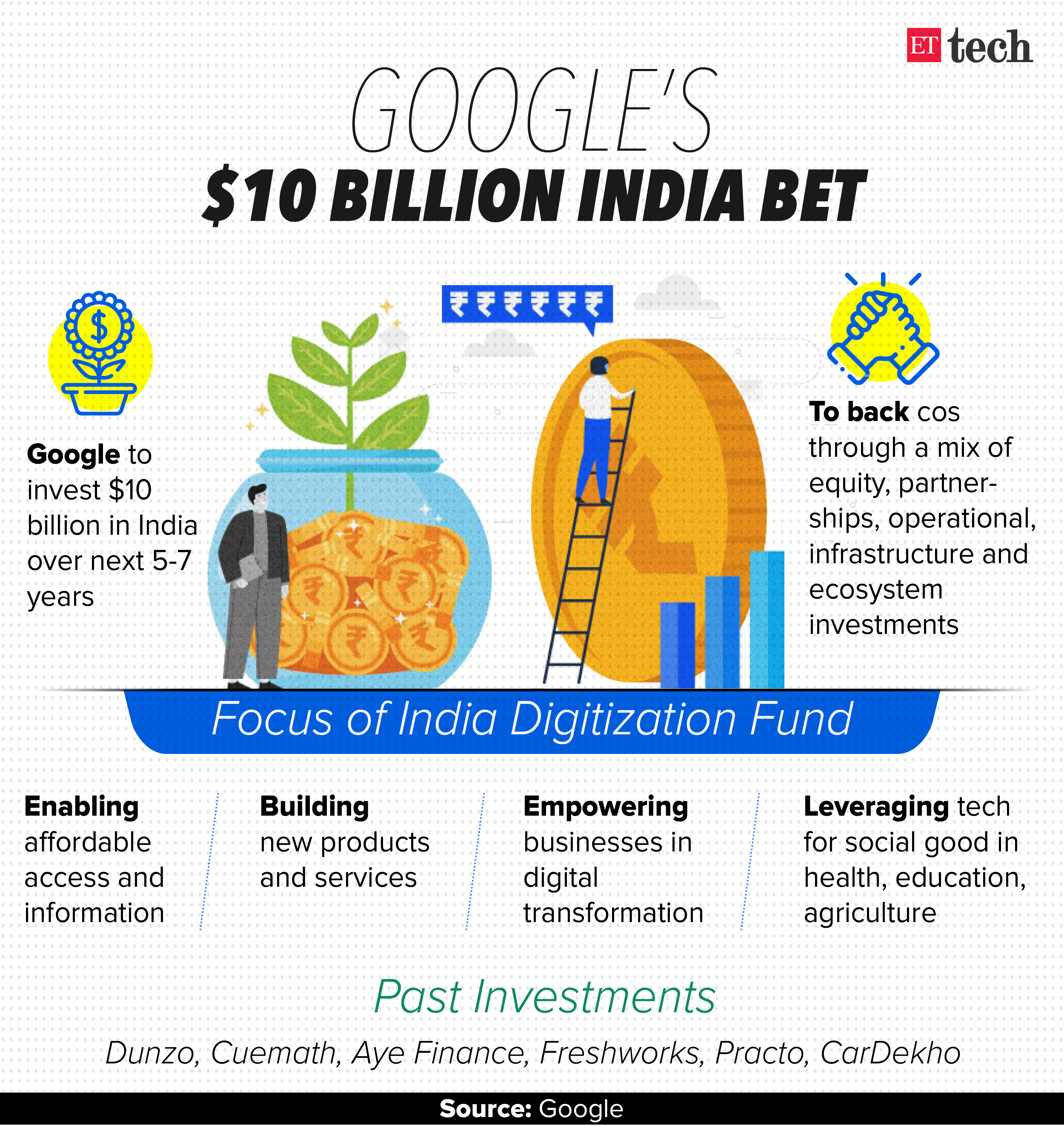
Google will invest $10 billion in India over the next five to seven years with the aim of consolidating its position in the digital ecosystem of the world’s fifth-largest economy that is emerging as a battleground for global internet giants.
Alphabet Inc-owned Google’s outlay for India — nearly double the $5.7 billion investment made by rival Facebook in the digital platform of India’s largest conglomerate Reliance Industries in April — will be deployed through a mix of investments and partnerships, chief executive officer Sundar Pichai told ET in an exclusive interview on Monday morning.
“It’s a unique opportunity given where India is poised. We are looking forward to working with Indian businesses of all sizes,” he said in the video interview.
Pichai neither denied nor confirmed reports of Google’s interest in Jio Platforms or a stake acquisition in Vodafone Idea. The country-specific nature of the fund is the first of its kind in the world for Google. “We’ll do it (deploy funds) through a mix of equity investments in large Indian companies, startups, partnerships, as well as infrastructure investments such as data centres,” he said. The fund size, he said, provides an “opportunity to directly make larger investments” in bigger companies.
Google dominates search, video, maps and email in India. Nine out of 10 smartphones sold in India come with Google’s Android OS.

Commenting on the equalisation levy imposed by India, Pichai said he favoured adoption of the Organisation for Economic Cooperation and Development (OECD) framework to tax foreign digital transactions.
Focus on companies that can build for India
The mega-investment plans are also one way to combat the issue, which has seen a pushback from other US technology companies as well. “Investing in a country directly is the best way to address the problem in the long run,” Pichai said.
Pichai, among the most successful Indian immigrants in the US, has been critical of US President Donald Trump’s move to suspend H-1B visas. Google was the top recipient of the visas in 2019, according to the US Citizenship and Immigration Services (USCIS).
“The free flow of ideas and people have definitely benefited the US. In the long run, it helps connect countries closer,” said Pichai, without elaborating on his June 23 comment, when he tweeted that he was disappointed with the Administration’s move.
“It’s (immigration) definitely been a net positive for the US, increasingly, as we deal with complex issues like AI, we need to globally work together to achieve these things,” said the IIT-Kharagpur engineer credited with leading the development of Google’s Android platform. Along with Satya Nadella of Microsoft, Pichai is one of the two global CEOs of Indian origin to lead technology companies with market cap of over $1 trillion.
“Talent flows both ways. It really helps countries and economies in the long run,” he said.
Google will be looking out for companies that can build for India and scale up quickly across languages, according to Pichai, who said capabilities such as artificial intelligence will make it very “interesting” for Google.
“We want to scale beyond English and really invest in access, so that effectively Indians in their own language be it Punjabi or Tamil (can access internet),” the Indiaborn CEO said. Google’s push to build local products has been boosted with the success of payment app Google Pay, which is now being scaled up globally.
Read: Google India makes an education push with CBSE partnership
India has over 500 million internet users, with 450 million of them accessing it on smartphones from smaller towns in the country.
With China, which has local behemoths such as Baidu and ByteDance, largely out of bounds for western internet companies, India is the only large market open to them. Google, under Pichai’s leadership, has been attempting to re-enter China, after exiting it a decade ago, but has faced setbacks. Last week, Bloomberg reported that Google had abandoned plans to set up a cloud unit in the country. It has also suspended processing user requests from Hong Kong after China imposed a national security law in its special administrative region.
Pichai did not comment on Google’s China ambitions but said India has the local talent and access to a large market along with aspects of a strong entrepreneurial and venture capital foundation to build an ecosystem of its own.
On whether he looks at the call of Atmanirbhar Bharat by Prime Minister Narendra Modi as a threat for American tech companies like Google, he said his company is trying to develop apps in India as well as invest in firms which are doing it. “We want to help play a small role in accelerating that trend.”
“We are definitely happy to partner with governments, in compliance with laws in a democratic society. Privacy regulation is incredibly important,” said Pichai, who earlier in the day interacted over video with PM Modi.
This morning, had an extremely fruitful interaction with @sundarpichai. We spoke on a wide range of subjects, parti… https://t.co/L3IMC91yFd
— Narendra Modi (@narendramodi) 1594626397000
Responding to a query on whether Google will extend its initiative to pay publishers for content in countries like Australia, Pichai said it was still “early days”.
“We have tried to incorporate news more in our products to generate more traffic. We’ve over the last couple of years added subscriptions as a big area,” Pichai said.
Speaking at the company’s flagship Google for India event later in the day, union minister for electronics and IT Ravi Shankar Prasad said: “India’s app economy is growing very powerfully, but we must not just download apps. It is important also to upload apps from India. I am sure with this new fund, Google will also focus on promoting our startups further.”
Read: Google should use AI in agriculture, weather prediction, healthcare: Ravi Shankar Prasad
Leave a Reply